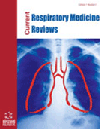-
s The Diagnostic Utility of Pleural Fluid Tests in Clinical Practice
- Source: Current Respiratory Medicine Reviews, Volume 8, Issue 5, Oct 2012, p. 383 - 390
-
- 01 Oct 2012
Abstract
The analysis of pleural fluid (PF) is the most important diagnostic element in identifying the cause of pleural effusions. The measurement of proteins and lactate dehydrogenase in PF and blood establishes the transudative or exudative nature of effusions. Elevated concentrations of natriuretic peptide NT-proBNP (>1500 pg/mL) are virtually pathognomonic of heart failure. In exudates with predominantly polymorphonuclear leukocytes (>50%), a bacterial infection of the pleural space should be considered, particularly if pleural fluid C-reactive protein levels are high. A pleural pH <7.20 in a parapneumonic effusion is an indication for the need of a drainage tube. When lymphocytes predominate in an exudate, cancer and tuberculosis are the two main diagnoses to consider; an adenosine deaminase activity >35 U/L strongly supports the diagnosis of tuberculosis. The cytological study of PF is negative in 40% of malignant effusions. Performing immunocytochemistry on the cell block and measuring tumor markers, such as mesothelin, can increase the diagnostic yield for malignancy.


